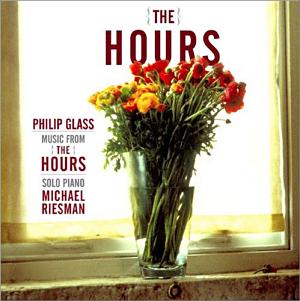Music from The Hours - Piano Solo
Music composed by Philip Glass
Performed by Michael Riesman
Arranged for piano by Michael Riesman and Nico Muhly
Available on Orange Mountain Music, Inc. (omm0012)
Running Time: 57:20
Amazon UK Amazon US

See also:
- The Hours (original soundtrack)
- The Fog of War
Every end is a beginning and every beginning is an end, but not without a climax or more; given that defining moments are often inseparable from everyday events, a portion of what leads up to them and occurs afterwards are cropped to contain that moment in a story or used as segues for the next moment. No part of the three stories in Stephen Daldry's film The Hours flow easily or smoothly into the next, but each episode is a thoughtful glimpse into a day and life of three women that revolve around—and parallel—the creation of Virginia Woolf's Mrs. Dalloway.
To set the mood for the nine Academy Award-nominated film, The Hours, the director went straight to the source of the author's inspiration, Philip Glass (well, after a detour through an abortive score by Michael Nyman). The movie is based on the Pulitzer Prize-winning novel by Michael Cunningham and is a tale of synchronism in the lives of three women, three locations, and three periods in time. With so many trinomial groupings, each of the stories can simply be reduced to three ordinal or linear parts (i.e. first, second, third; exposition, climax, and resolution); however, these incidences are wholly independent of time (in the linear sense) since they appear to be happening simultaneously, but they all exist in the penumbra of a potential reality. That reality is the insight derived from the subtleties and nuances of repetition in life.
Patterns, order, time, chaos... In order for the interspersed and interwoven revelations to culminate successfully, the unique atmosphere of Daldry's film required a specific focus. As Cunningham's longtime inspiration, Glass was the obvious choice to provide that focus via his score, especially so given that his music was frequently listened to by the author for many years during his writing.
This Orange Mountain Music album is the effort of pianist, Michael Riesman, who was sufficiently enthralled by the original piano centred soundtrack to make a piano suite based on the music of the film. Riesman, together with Nico Muhly, found it possible to arrange every piece for the solo piano, but special care was put into the first cue 'The Poet Acts'.
The very nature of Glass's music corresponds with the character repetition on screen, but in this film, it also paradoxically provides the focus for the story much like an aural chronograph. From the 1920s, 40s, to 2001, the film's timeline spans eighty years and attentively covers the natures of love, sexuality, and obligation in each time frame; but placed in the greater context of everyday events, the story's quantum physics-type coevality of Mrs. Dalloways could be happening with anyone, anywhere, and at anytime. Glass's nebulous score has no true relation to the frequent period transitions, but it serves as an ever-fickle, separate, yet congruous and consistent identity all throughout the film. It becomes a character of its own, attempting to tie together the series of events in a neater fashion than images, script and acting alone.
Riesman's piano, however, takes away from what was essentially a more 'focused' Glass by cutting out the intertwined moods brought by instrumental fusion; it focuses more on what is a straightforward expression of emotions rather than conveying the murky, ethereal quality of the original. Regardless of all that a piano does, it frequently articulates the essence of complex pieces when musics not originally composed for the instrument are performed on it; it lacks the subtle flavors of various instruments since it tries to encompass so much at one time. This album is only similar to its predecessor in carried over notes and technical proficiency, but lacks the aesthetic value of the original.
Of the fourteen tracks, the aforementioned cue, 'The Poet Acts', is perhaps the truest-to-Glass arrangement in that the right hand is fairly complex with the four to three mutable ostinatos. (It could be interpreted as the interplay of chaos and order: three for the turmoil and four for the orderly movement of time; they coexist and seemingly cannot communicate effectively unless paired with the other.) This track, more so than others, captures the leitmotifs Glass used to underscore the living vortex of so many lives in so many moments and the intrinsic restlessness of all three women.
If the original score can be considered a separate entity, it is almost as though if the technical modifications of Glass's music produce a further removed - and alien, 'Mrs Dalloway'. Where the overt changes in culture and progression in personal freedom were still unable to accommodate the Dalloway incarnations, this somewhat hypnotic album is unable to accommodate the listener with a pure Philip Glass experience. Michael Cunningham believes that amongst the myriad similarities and inevitable repetition, only in the subtleties and inflections of these actions do we extract what we need to find life fulfilling. The Hours solo piano CD simplifies these elements in such a way that cannot or probably should not be so easy to define for a remarkably in-depth film and matching, aqueous score.
Tina Huang
3
Return to Index